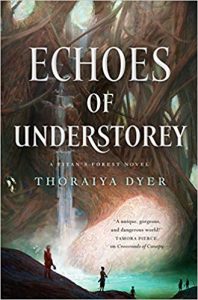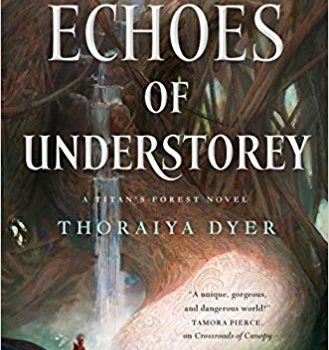Katharine Coldiron Reviews Echoes of Understorey by Thoraiya Dyer
 Echoes of Understorey, Thoraiya Dyer (Tor 978-0-7653-8595-6, $16.99, 350pp, pb) February 2018.
Echoes of Understorey, Thoraiya Dyer (Tor 978-0-7653-8595-6, $16.99, 350pp, pb) February 2018.
Readers who enjoyed the first book in Thoraiya Dyer’s Titan’s Forest series will probably enjoy the sequel, Echoes of Understorey. The two books have in common a breathtakingly complex world, magic and ability tied to animal and natural realms, a powerful and self-sabotaging female protagonist, and potent political and racial allegories. Readers who found Crossroads of Canopy a mixed bag will find Echoes the same. Though the book’s world is dazzlingly foreign and the heroine leads us on thrilling adventures, the plot is byzantine enough to require rereading, characterization is sometimes illogical, and the pacing is odd. This series offers an unmatched level of world-building, a universe so complete that it sometimes feels as if the reader has only glimpsed a portion of what Dyer has in mind, as if she is actually a visitor from Titan’s Forest, setting down a story of her world, rather than an author dreaming up something fictional.
Still, such intricacy is a double-edged blade, and if the detail is not grounded in character, in meaning, it’s all set dressing. Fortunately, there is meaning here. Imeris, who was an infant throughout most of Crossroads of Canopy, emerges as a warrior, injustice-fighter, witch-hunter, and important transitional figure between the various levels of this forest world. (The world, and the plot, are so complicated that this entire review could be expended on summarizing them.) Though she often makes mistakes, she learns from them readily and manages to unfold multiple layers of conflict and hypocrisy among the upper echelons of the culture she inhabits. Because of her, some of the gods stop fighting among themselves and come to an accord; because of her, hope is restored among the slave class.
However, Imeris’s movement between social strata, from conferring with her goddess sister to a ride through the darkness of Floor on the back of a bird, takes its toll on her. She hopes for unity: “All my separate faces will become one face. All my pulled apart pieces will become one piece,” but the reader knows this is impossible. Imeris is most useful, and most interesting, as a bridging figure, not as a warrior whose fate forges only one path.
One of the main flaws in Crossroads of Canopy was its central character, Unar, whose ambition and entitlement were so all-encompassing that I shouted aloud in relief when she finally got her comeuppance. Echoes has a much more appealing protagonist. Imeris is nearly as driven as Unar, but she searches for her destiny rather than over-engineers it. The other characters in the novel provoke conflicts of greater and lesser effectiveness. Oniwak, the leader of a hunting party Imeris joins, treats her with misogyny familiar to any woman of our own world, which Imeris counters with patience and confidence. A companion, Daggad, is lovable and often funny, and grounds some scenes in welcome emotional truth. Unar returns, more sober and grouchy, a bit grandmotherly despite only being in her early 20s. Also returning is Aurilon, the enigmatic, snakelike bodyguard of one of the gods, who continually challenges Imeris, offering snippets of her particular wisdom: “The dead make poor pupils. Besides, I know truth when I hear it, and when you said the words I could, I heard I could never beneath them.”
Then there is Horroh, a mentor figure, who vanishes from the book dramatically before we have a chance to know him. There is Igish, Imeris’s biological mother, who does not really emerge as a character at all, but is more of a plot device. The least consistent character is Anahah, a bodyguard, sometimes a source of sexual tension with Imeris and sometimes little more than a rebellious NPC. His character journey is beyond bizarre, and creates gender challenges the novel does not answer. Aurilon, too, acts oddly out of character once or twice; her final advice echoes Glinda the Good Witch, and her fate feels like an awkward rewrite rather than an authentic turn.
The plot of Echoes of Understorey is constructed in an unfamiliar pattern. A set piece and crisis opens the book, a fellowship-journey staggers along in pursuit, and after that journey concludes in a Rube Goldberg-inspired victory, a sudden second victory closes the novel as well as closing the crisis that opened it. The bulk of the novel is spent on a journey far more important to Canopy than it is to Imeris, and the journey that matters most to Imeris begins and concludes in just a handful of pages that frame the other story. Because Titan’s Forest is toweringly high fantasy, with dialogue as formal and stylized as Tolkien’s, a nonstandard plot pattern is doubly bewildering.
For all these problems, Echoes of Understorey is a satisfying read, and a delirious second dive into a complete, absorbing fantasy universe. I may have had to refer to the map at the front of the book, and the lengthy poem from Crossroads of Canopy that gestures to each of the thirteen gods’ powers, numerous times in order to keep things straight in my head, but what a gift it is to read a book that requires such immersion, that demands such a buy-in. Following every strand of plot and every twist of characterization proves a challenge, but it represents an impressive authorial commitment and provides readerly rewards worth savoring. Titan’s Forest may be a difficult series to like, but it’s an easy series to love.
Katharine Coldiron is the author of Ceremonials (Kernpunkt Press), an SPD fiction bestseller. Her work as a book critic has appeared in The Washington Post, The Believer, The Guardian, and many other places. She lives in California and at kcoldiron.com.
This review and more like it in the July 2018 issue of Locus.
 While you are here, please take a moment to support Locus with a one-time or recurring donation. We rely on reader donations to keep the magazine and site going, and would like to keep the site paywall free, but WE NEED YOUR FINANCIAL SUPPORT to continue quality coverage of the science fiction and fantasy field.
While you are here, please take a moment to support Locus with a one-time or recurring donation. We rely on reader donations to keep the magazine and site going, and would like to keep the site paywall free, but WE NEED YOUR FINANCIAL SUPPORT to continue quality coverage of the science fiction and fantasy field.







